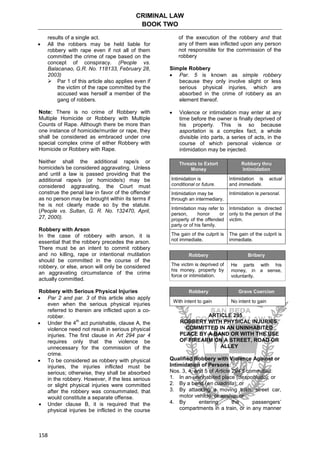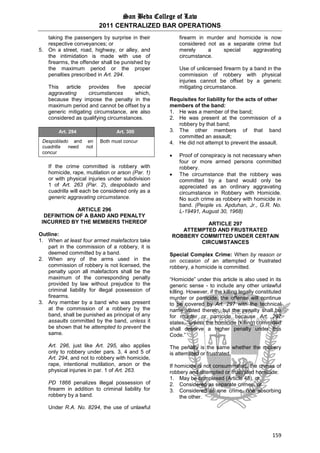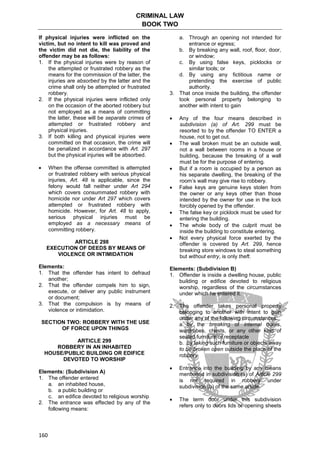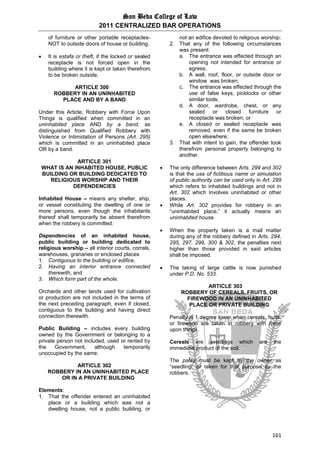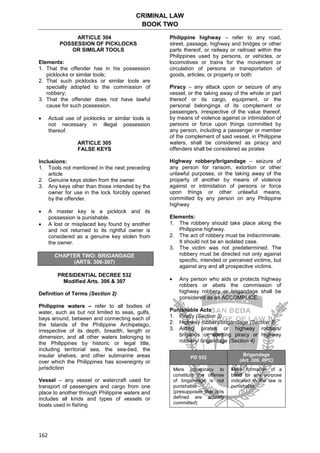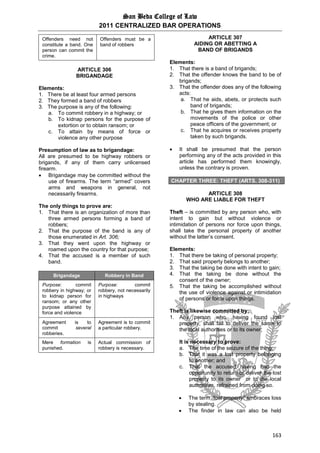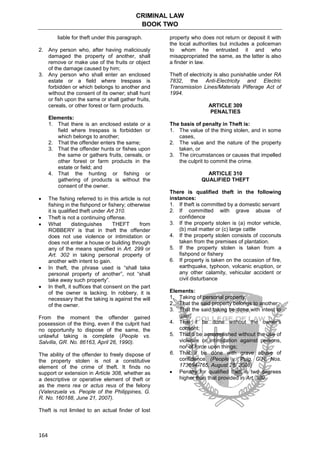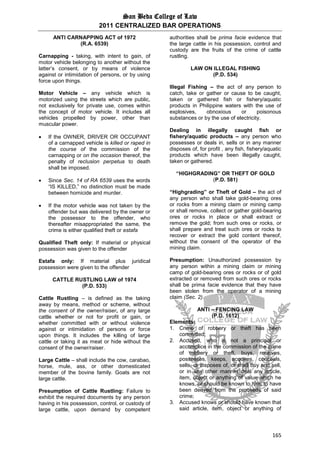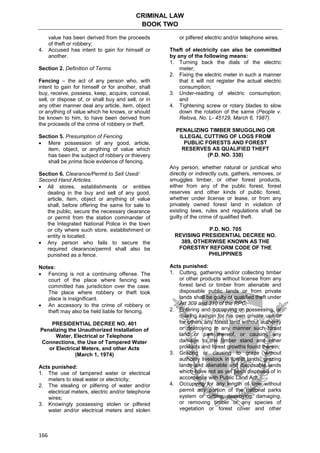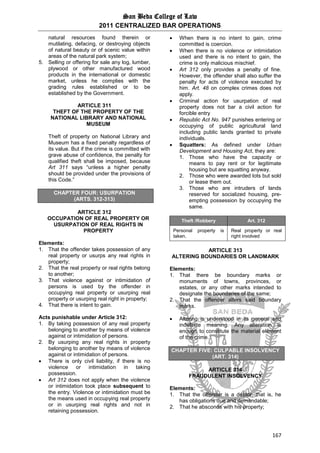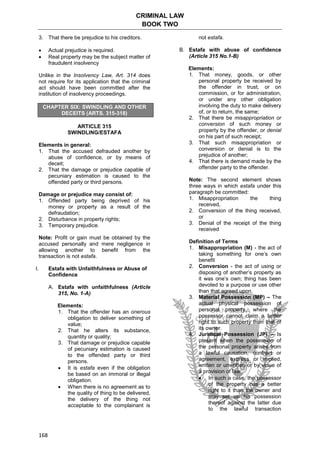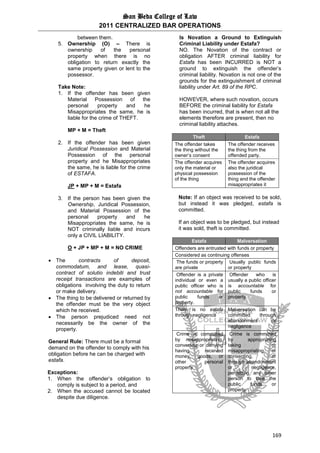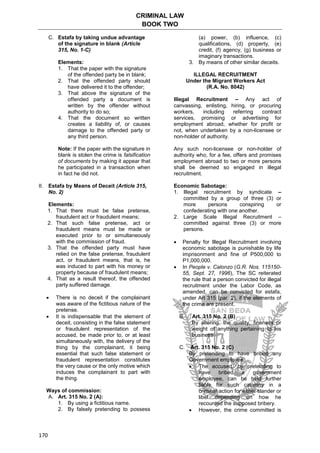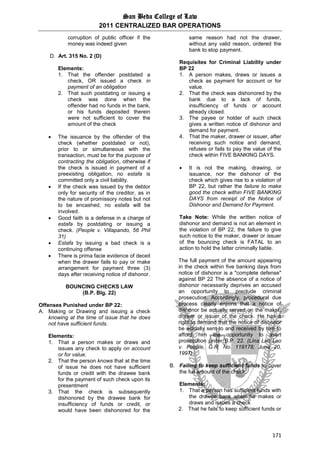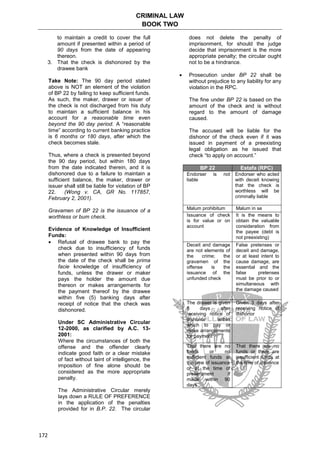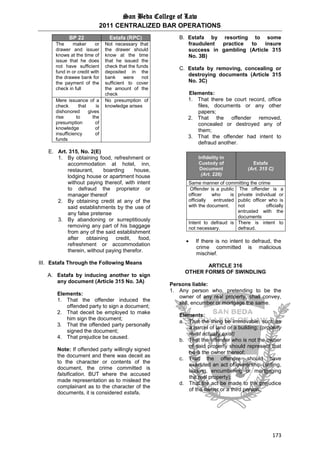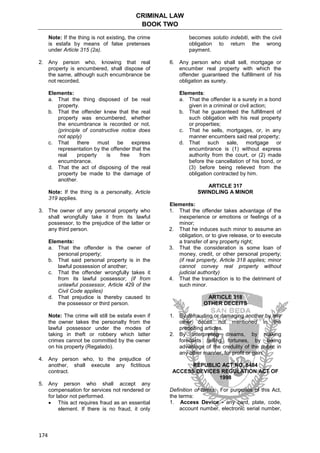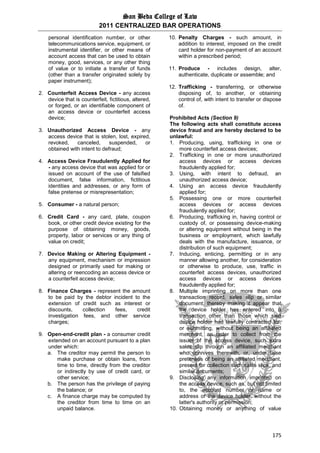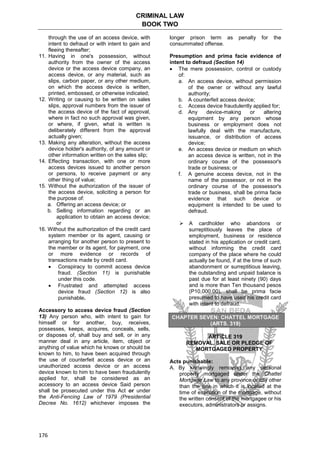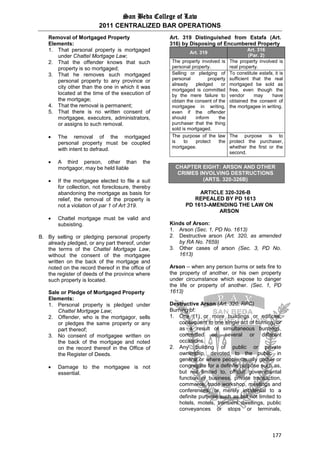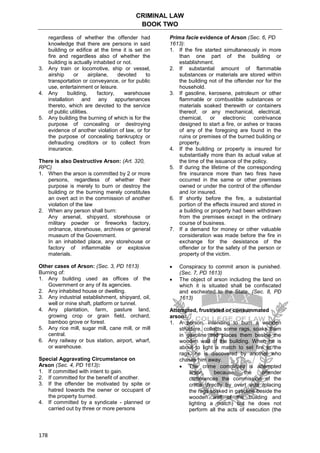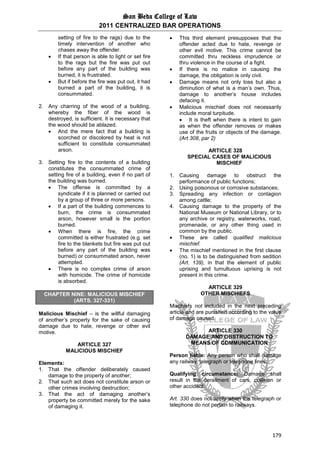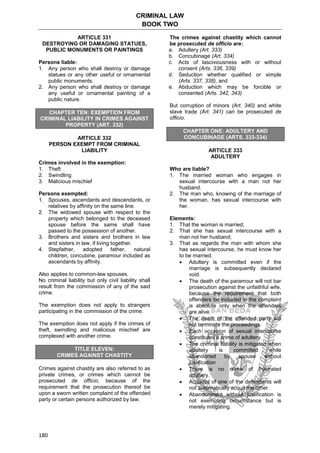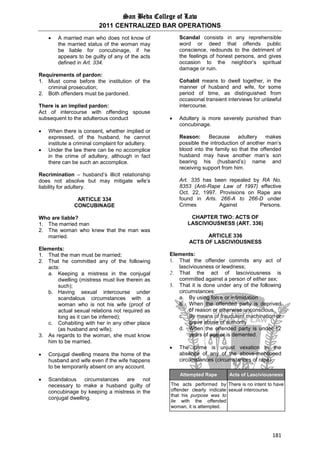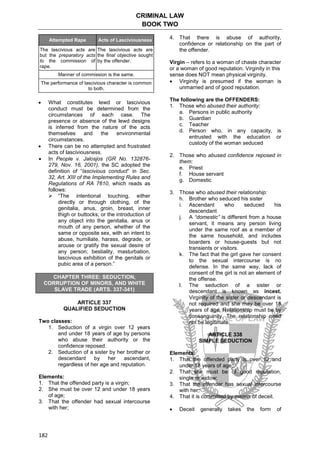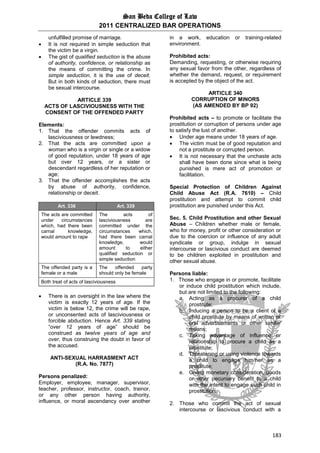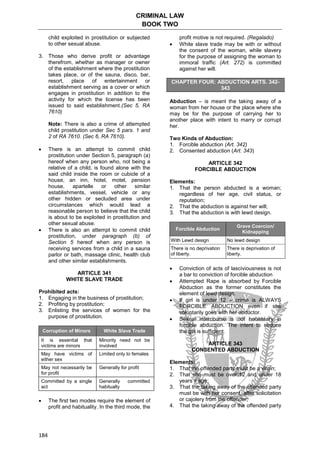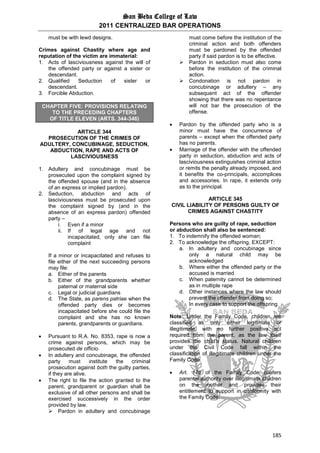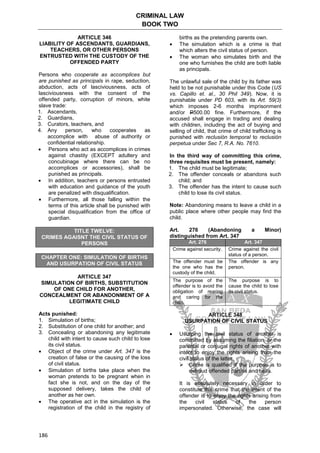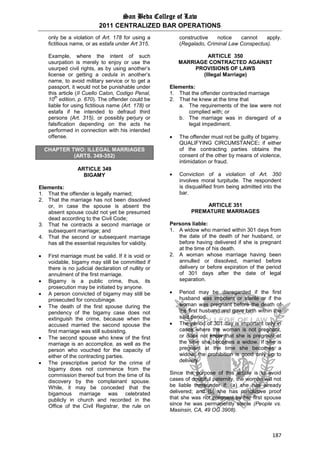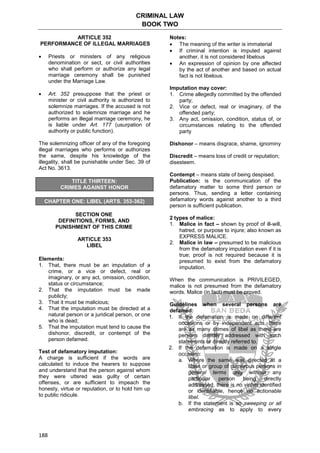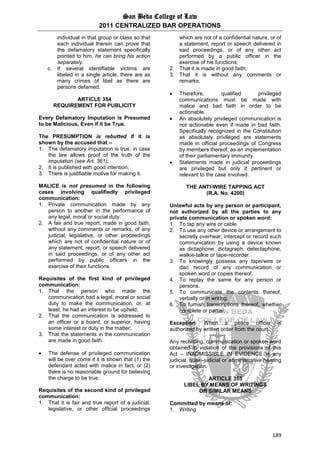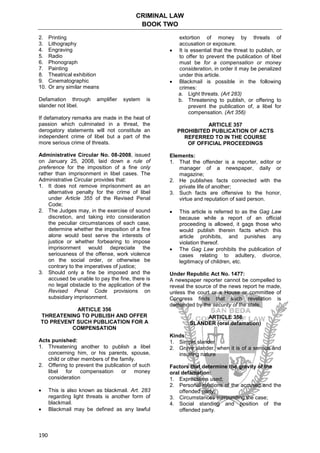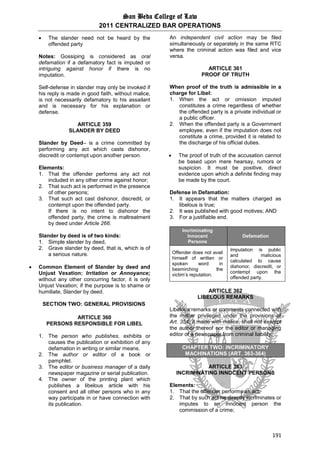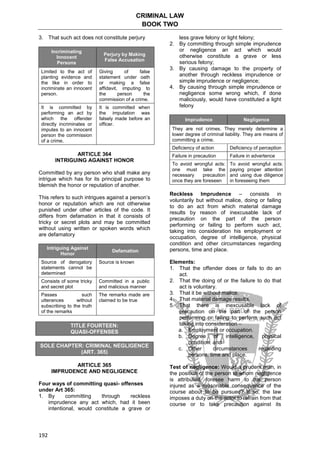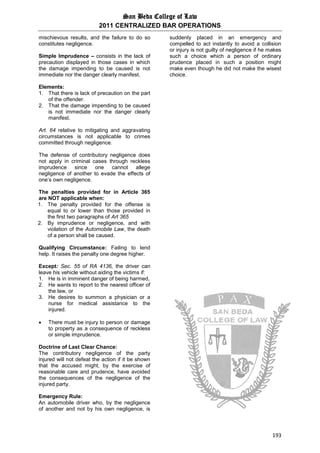This document outlines the executive committee and subject committee members for the 2011 Centralized Bar Operations of San Beda College of Law. It provides the names and roles of the overall chairperson, vice-chairpersons, subject chair, and members. It also includes summaries of relevant provisions of the Revised Penal Code on crimes against national security, such as treason, conspiracy and proposal to commit treason, misprision of treason, and espionage. Commonwealth Act No. 616, which further punishes espionage and other offenses against national security, is also summarized.
![San Beda College of Law
2011 CENTRALIZED BAR OPERATIONS
EXECUTIVE COMMITTEE:
EZEKIEL JOSHUA VILLENA overall chairperson, MINISTER MOISES DU chairperson for academics, DJOANIVIE JOMARE
JUNASA chairperson for hotel operations, MARIE MICAELA STA. ANA vice-chairperson for operations, MIKHAIL MAVERICK
TUMACDER vice-chairperson for secretariat, JACKIE LOU LAMUG vice-chairperson for finance, DIANA JEAN TUAZON vice-
chairperson for edp, JASSEN RALPH LEE vice-chairperson for logistics
SUBJECT COMMITTEE:
JO ANN MARIE O. CASIO subject chair, VENICE BUAGÑIN assistant subject chair, STEVEN MICHAEL D. GALA edp,
MARIONNE ROSABELL LACUNA book one, MARIS DONNA KWOK book two, MA. KATRINA RIVERA special penal laws
MEMBERS:
Karell Marie G. Lascano, Katrina Jorelle P. Villena, Clare Marie F. Ortega, Hera Aiza Marie A. Barona, Nicole Alora G. Julian ,
Rozzalle Gonzales, Sheena Antlan, Diana Jean De Castro, Beatrice Valerie S. Guillermo, Raynan Larosa, Kamille Deanne
Lagasca, Jose Angelo David
TITLE ONE:
CRIMES AGAINST NATIONAL SECURITY
AND THE LAW OF NATIONS
Section One: Treason and Espionage
ARTICLE 114
TREASON
Treason – a breach of allegiance to a
government, committed by a person who owes
allegiance to it.
Allegiance – the obligation of fidelity and
obedience which the individual owes to the
government under which he lives or to his
sovereign, in return for the protection he
receives. Hence an alien residing in the
Philippines may be prosecuted for acts of
treason due to the temporary allegiance he
owes to the Philippine government.
Elements of treason:
1. That the offender owes allegiance to the
Government of the Philippines; (a Filipino
citizen or an alien residing in the
Philippines.)
Place of commission:
Filipino Citizen: anywhere (Art.2,
RPC)
Alien: only in the Philippines (EO
44) except in case of conspiracy
An alien owes permanent
allegiance to his own country, at
the same time, a temporary
allegiance to the country where he
resides.
2. That there is a war in which the Philippines
is involved;
Treason is a war crime. It remains
dormant until the emergency arises.
But as soon as war starts, it is put into
effect (Laurel vs. Misa, 77 Phil 865
[1946])
3. That the offender either (modes of
committing):
a. Levies war against the government; or
b. Adheres to the enemies, giving them
aid or comfort.
Ways of being committed:
1. Levying war
It means that (a) there is an actual
assembling of men (b) for the purpose
of executing a treasonable design by
force.
It is not necessary that there be a
formal declaration of the existence of
a state of war. Actual hostilities may
determine the date of the
commencement of war (U.S. vs
Lagnason, 3 Phil 495)
The levying of war must be with intent
to overthrow the government not
merely to resist a particular statute or
to repel a particular officer. It is not
necessary that those attempting to
overthrow the government by force of
arms should have the apparent power
to succeed in their design, in whole or
in part.
Treason by Levying
War
Rebellion
The purpose of levying
war is to help the
enemy.
Such purpose is not
necessary. (e.g. civil
uprising)
Treason Sedition
Philippines must be at
war with another
country
Internal conflict
Violation of oath of
allegiance
Causing disturbances
in one’s country
Adherence to the enemies, giving them aid
and comfort
Requires BOTH
1. adherence to the enemies, and
2. giving of aid or comfort to them
Note: Mere adherence without its physical
manifestation through the giving of aid or](https://image.slidesharecdn.com/crimiibook2-160120043435/75/Crim-ii-book-2-1-2048.jpg)
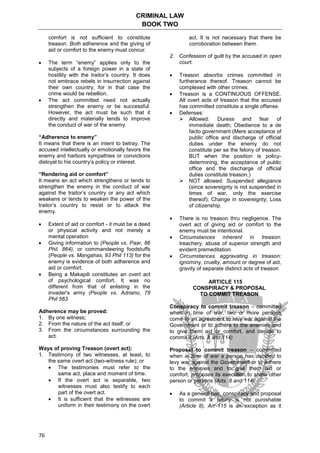
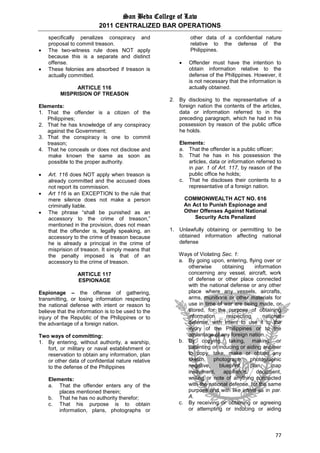
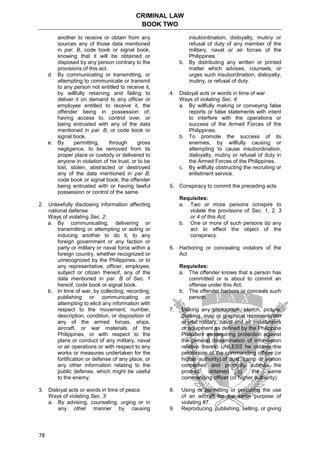
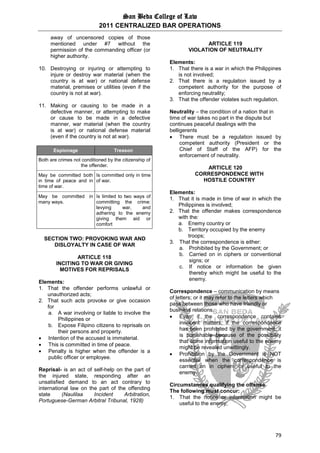
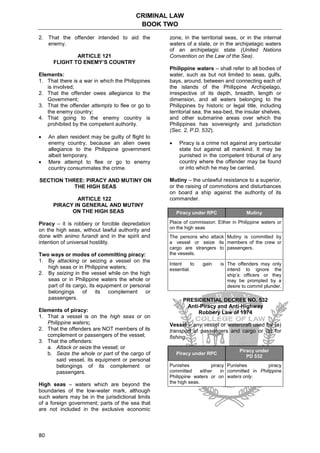
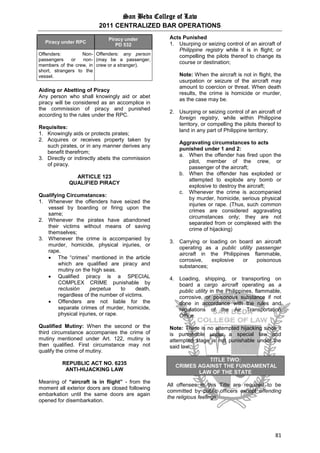
![CRIMINAL LAW
BOOK TWO
82
CHAPTER ONE: ARBITRARY DETENTION
OR EXPULSION, VIOLATION OF
DWELLING, PROHIBITION,
INTERRUPTION, AND DISSOLUTION OF
PEACEFUL MEETING AND CRIMES
AGAINST RELIGIOUS WORSHIP (ARTS.
124-133)
SECTION ONE: ARBITRARY DETENTION
AND EXPULSION
ARTICLE 124
ARBITRARY DETENTION
Elements:
1. That the offender is a public officer or
employee;
2. That he detains a person;
3. That the detention is without legal ground.
Detention – a person is detained when he is
placed in confinement or there is restraint on
his person.
Detention need not involve any physical
restraint. Psychological restraint is
sufficient. If the acts and actuations of the
accused can produce such fear in the
mind of the victim sufficient to paralyze the
latter, to the extent that the victim is
compelled to limit his own actions and
movements in accordance with the wishes
of the accused, then the victim is, for all
intents and purposes, detained against his
will (Astorga vs. People, G. R. No. 154130
Oct. 1, 2003).
Legal grounds for the detention of
persons:
1. The commission of a crime
2. Violent insanity or other ailment requiring
compulsory confinement of the patient in a
hospital
Note: This is list is not exclusive so long
as the ground is considered legal (e.g. in
contempt of court, under quarantine, or a
foreigner to be deported).
The public officer liable for arbitrary
detention must be vested with authority to
detain or order the detention of persons
accused of a crime, but when they detain
a person they have no legal grounds
therefor.
If the detention is perpetrated by other
public officers NOT vested with authority
or any private individual, the crime
committed is illegal detention (Art. 267 or
268).
The penalty for Arbitrary Detention
depends upon the period of detention
involved. A greater penalty is imposed if
the period is longer.
Arrest without a warrant is the usual cause
of arbitrary detention. The crime of
unlawful arrest is, however, absorbed in
the crime of arbitrary detention.
Arrest without warrant – when LAWFUL:
1. When, in his presence, the person to be
arrested has committed, is actually
committing, or is attempting to commit an
offense;
“In his presence” – when the officer
sees the offense being committed,
although at a distance, or hears the
disturbance created thereby and
proceeds at once to the scene thereof,
or when the offense is continuing or
has not been consummated at the
time the arrest is made, the offense is
said to be committed in his presence.
(U.S. vs. Samonte, 16 Phil 516 [1910])
2. When an offense has in fact just been
committed, and he has probable cause to
believe based on personal knowledge of
facts and circumstances that the person to
be arrested has committed it;
3. When the person to be arrested is a
prisoner, has escaped from a penal
establishment, or place where he is
serving final judgment or temporarily
confined while his case is pending, or has
escaped while being transferred from one
confinement to another. (Sec. 5, Rule 113,
Revised Rules of Criminal Procedure)
It may be committed through
imprudence.
ARTICLE 125
DELAY IN THE DELIVERY OF DETAINED
PERSONS TO THE PROPER
JUDICIAL AUTHORITIES
Elements:
1. That the offender is a public officer or
employee;
2. That he has detained a person for some
legal ground (Sec. 5, Rule 113, Rules of
Court);
3. That he fails to deliver such person to the
proper judicial authorities within:
a. 12 hrs. for offenses punishable by light
penalties or their equivalent.
b. 18 hrs. for offenses punishable by
correctional penalties or their
equivalent.
c. 36 hrs. for offenses punishable by
afflictive penalties or their equivalent.](https://image.slidesharecdn.com/crimiibook2-160120043435/85/Crim-ii-book-2-8-320.jpg)
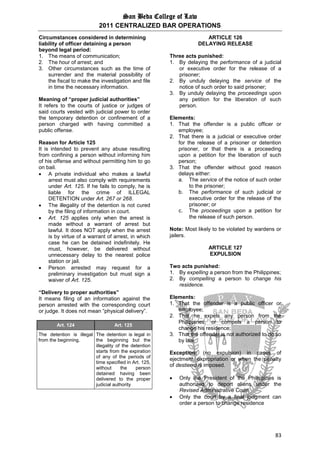
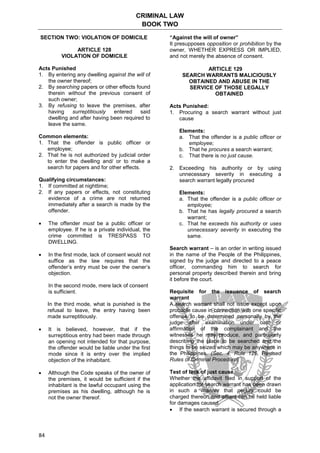
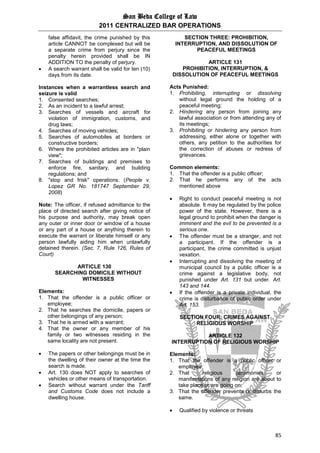
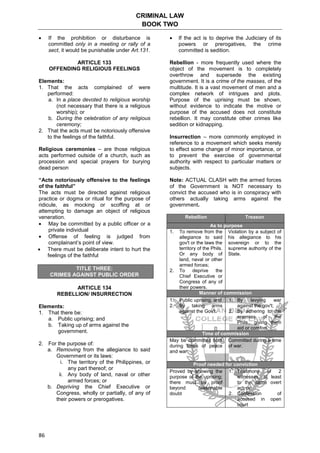
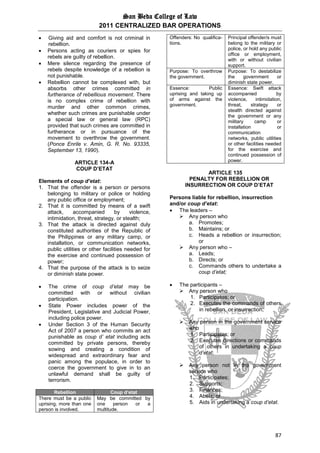
![CRIMINAL LAW
BOOK TWO
88
Who shall be deemed the leader of the
rebellion, insurrection or coup d’etat in
case he is unknown?
Any person who in fact:
1. Directed the others,
2. Spoke for them,
3. Signed receipts and other documents
issued in their name, or
4. Performed similar acts, on behalf of the
rebels.
Being a mere assistant to a principal, guilty
of rebellion and punishable under the
second paragraph of Art. 135 is a
participant in the commission of Rebellion.
(People v. Lava, 28 SCRA 72 [1969])
Political Crimes – in contrast to common
crimes, are those directly aimed against the
political order, as well as such common crimes
as may be committed to achieve a political
purpose. The decisive factor is the intent or
motive.
Killing, robbing, etc., for private purposes
or profit, without any political motivation,
would be separately punished and would
not be absorbed in the rebellion. (People
vs. Geronimo, et al., 100 Phil 90 [1956])
ARTICLE 136
CONSPIRACY & PROPOSAL TO
COMMIT REBELLION, INSURRECTION
OR COUP D’ ETAT
Two Crimes penalized under this article:
1. Conspiracy to commit rebellion, and
2. Proposal to commit rebellion.
Conspiracy to commit rebellion – when two
or more persons come to an agreement to rise
publicly and take arms against the
Government for any of the purposes of
rebellion and decide to commit it
Proposal to commit rebellion – when the
person who has decided to rise publicly and
take arms against the Government for any of
the purposes of rebellion proposes its
execution to some other person or persons
This is an instance where the law punishes
preparatory acts.
ARTICLE 137
DISLOYALTY OF PUBLIC
OFFICERS/EMPLOYEES
Acts Punished
1. Failing to resist a rebellion by all means in
their power;
2. Continuing to discharge the duties of their
office under the control of the rebels;
3. Accepting appointment to office under the
rebels.
The offender must be a public officer or
employee.
The crime presupposes the existence of
rebellion by other persons; the offender
must not be in conspiracy with the rebels;
otherwise, he himself will also be guilty of
rebellion.
ARTICLE 138
INCITING TO REBELLION/
INSURRECTION
Elements:
1. That the offender does not take up arms or
is not in open hostility against the
Government;
2. That he incites others to the execution of
any of the acts of rebellion;
3. That the inciting is done by means of
speeches, proclamations, writings,
emblems, banners or other
representations (SPWEBO) tending to the
same end.
Proposal to Commit
Rebellion
Inciting to Rebellion
In both crimes, the offender induces another to
commit rebellion.
The person who
proposes has decided to
commit rebellion.
It is not required that the
offender has decided to
commit rebellion.
The person who
proposes the execution
of the crime uses secret
means.
The act of inciting is
done publicly.
Note: In both, the crime of rebellion should not be
actually committed by the persons to whom it is
proposed or who are incited. If they commit
rebellion because of the proposal or inciting, the
proponent or the one inciting may become a
principal by inducement in the crime of rebellion.
ARTICLE 139
SEDITION
Elements:
1. That the offenders rise:
a. Publicly; and
b. Tumultuously;
2. That they employ force, intimidation, or
other means outside of legal methods;
3. That the offenders employ any of those
means to attain any of the following
objects:](https://image.slidesharecdn.com/crimiibook2-160120043435/85/Crim-ii-book-2-14-320.jpg)
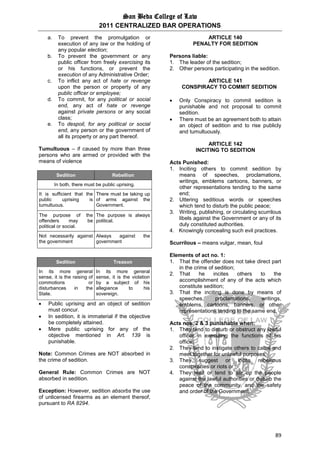
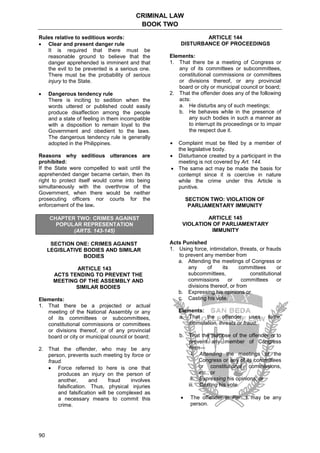
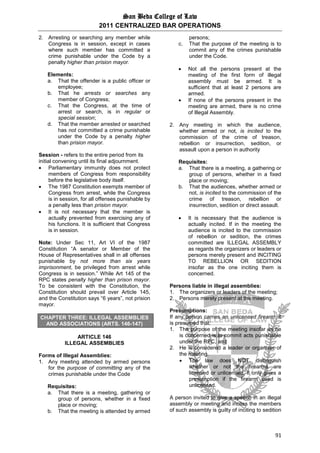
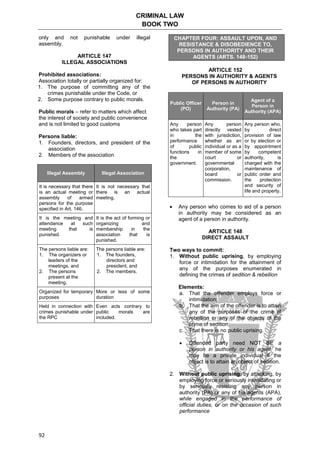
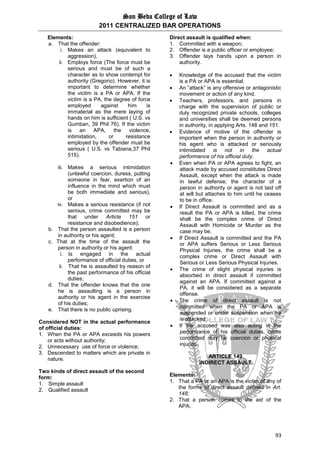
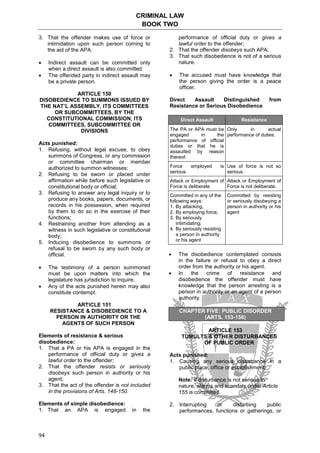
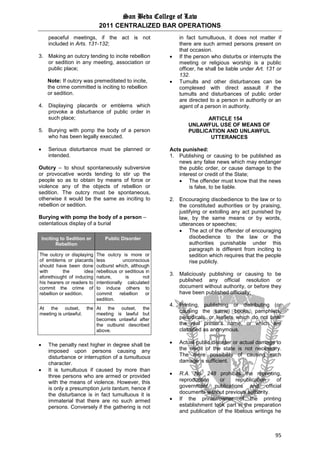
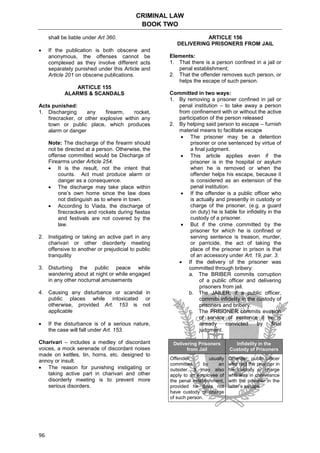
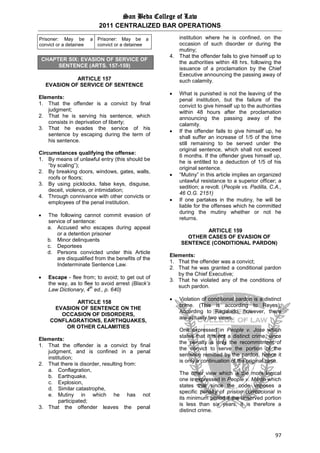
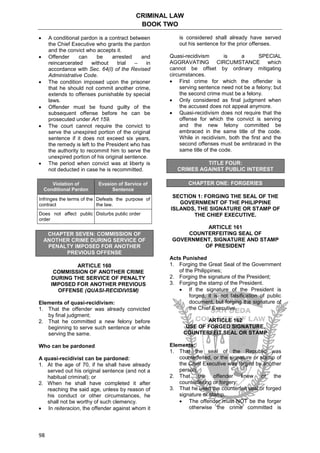
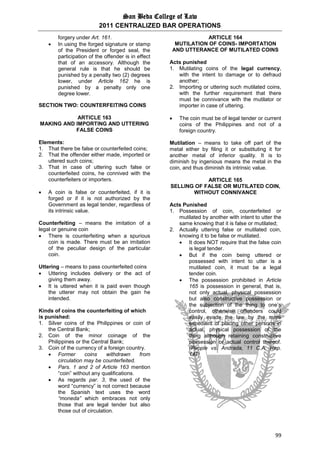
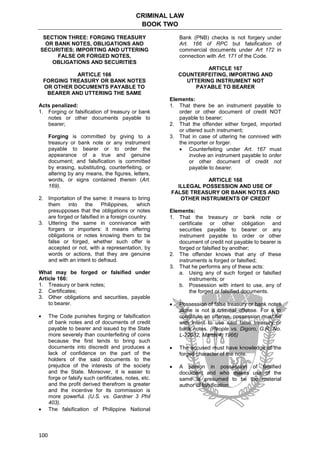
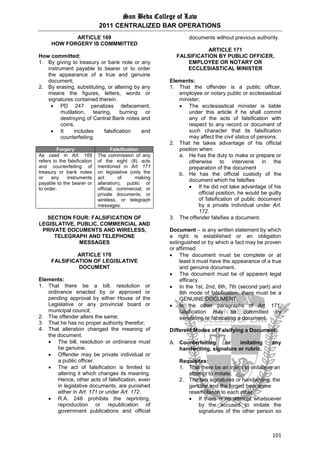
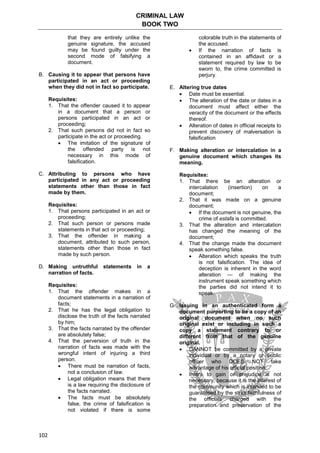
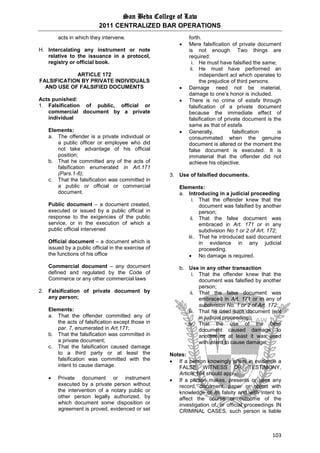
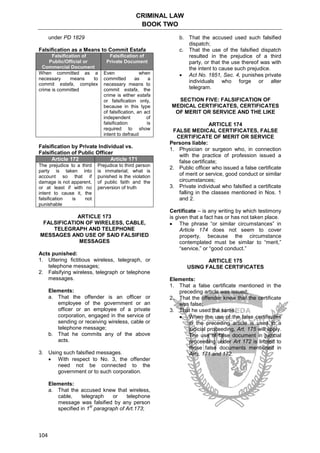
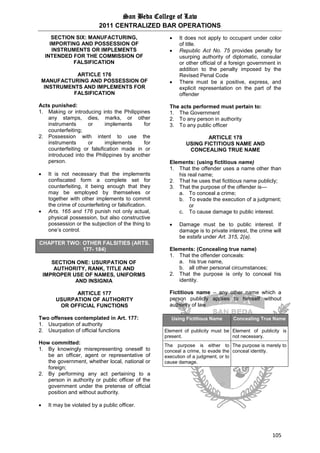
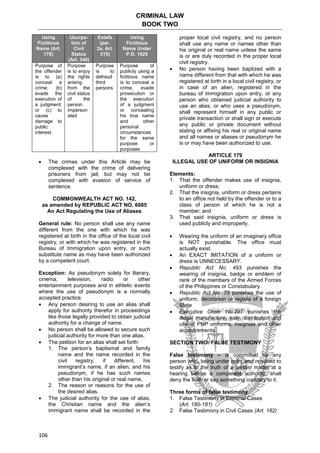
![San Beda College of Law
2011 CENTRALIZED BAR OPERATIONS
107
3. False Testimony in other cases (Art. 183)
ARTICLE 180
FALSE TESTIMONY AGAINST A
DEFENDANT
Elements:
1. That there be a criminal proceeding;
2. That the offender testifies falsely under
oath against the defendant therein;
3. That the offender who gives false
testimony knows that it is false;
Good faith is a defense
4. That the defendant against whom the false
testimony is given is either acquitted or
convicted in a final judgment.
Penalty depends upon the sentence of the
defendant against whom false testimony
was given.
Defendant must be sentenced to at least a
correctional penalty or a fine, or must be
acquitted.
The offender is liable even if his testimony
was not considered by court. The law
intends to punish the mere giving of false
testimony.
The testimony must be complete.
Art. 180 applies to Special Penal Laws
because Special Penal Laws follow the
nomenclature of the Revised Penal Code
ARTICLE 181
FALSE TESTIMONY FAVORABLE
TO THE DEFENDANT
The false testimony in favor of the
defendant need not directly influence the
decision of the acquittal and it need not
benefit the defendant.
Conviction or acquittal of defendant in
principal case is not necessary.
False testimony is punished not because
of the effect it actually produces but
because of its tendency to favor or to
prejudice the defendant.
A defendant who falsely testifies in his
own behalf in a criminal case can only be
guilty of Art. 181 when he voluntarily goes
upon the witness stand and falsely
imputes to some other person the
commission of a grave offense. If he
merely denies the commission of the crime
or his participation therein, he should not
be prosecuted for false testimony. (U.S.
vs. Soliman 36 Phil.5 [1917])
Testimony must be complete.
Rectification made spontaneously after
realizing the mistake is not false
testimony.
ARTICLE 182
FALSE TESTIMONY IN
CIVIL CASES
Elements:
1. That the testimony must be given in a civil
case;
2. That the testimony must relate to the
issues presented in said case;
3. That the testimony must be false;
4. That the false testimony must be given by
the defendant knowing it to be false;
5. That the testimony must be malicious and
given with an intent to affect the issues
presented in said case.
Art. 182 is NOT applicable when the false
testimony is given in special proceedings.
Civil case – an ordinary suit in a court of
justice, by which one party prosecutes
another for the enforcement or protection
of a right, or the prevention or redress or a
wrong and that every other remedy is a
special proceeding (People vs. Hernandez
67 O.G. 8330).
The criminal action for false testimony
must be suspended when there is a
pending determination of the falsity of the
subject testimonies of private respondents
in the civil case (Ark Travel Express vs.
Judge Abrogar 410 SCRA 148 [2003]).
ARTICLE 183
PERJURY
Two ways of committing perjury:
1. By falsely testifying under oath;
2. By making a false affidavit.
Falsely testifying under oath must NOT be
in a judicial proceeding.
Testimony must be complete.
Elements:
1. That the accused made a statement under
oath or executed an affidavit upon a
material matter;
2. That the statement or affidavit was made
before a competent officer authorized to
receive and administer oath;
3. That in that statement or affidavit, the
accused made a willful and deliberate
assertion of a falsehood;
4. That the sworn statement or affidavit
containing the falsity is required by law.](https://image.slidesharecdn.com/crimiibook2-160120043435/85/Crim-ii-book-2-33-320.jpg)
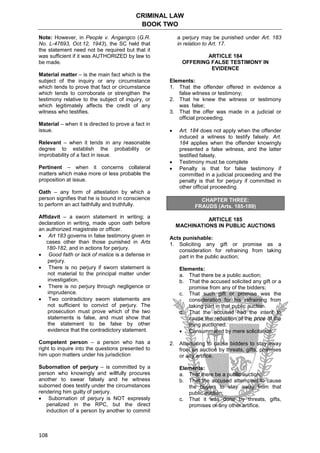
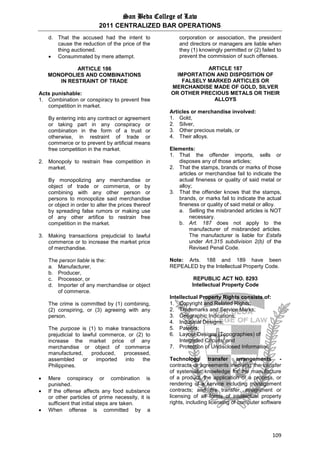
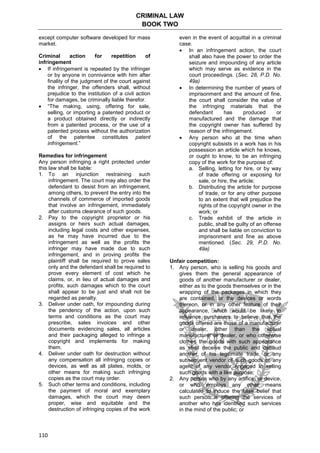
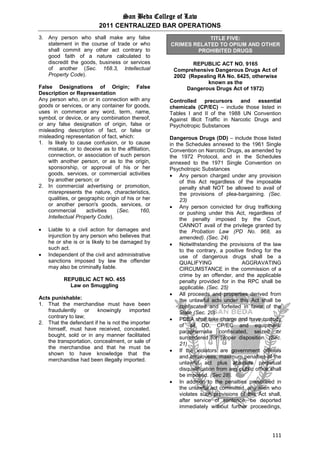
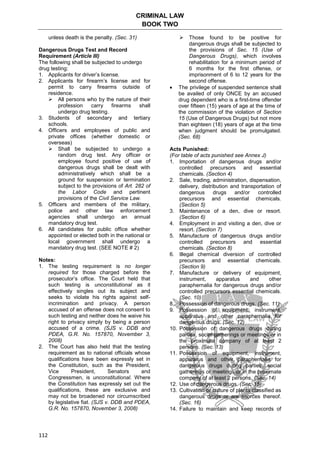
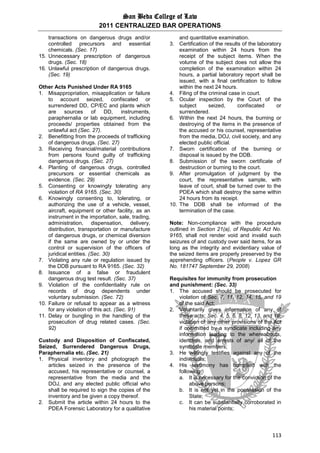
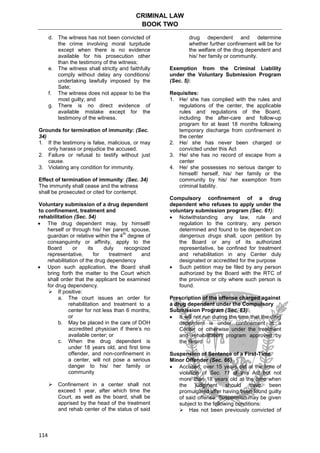
![San Beda College of Law
2011 CENTRALIZED BAR OPERATIONS
115
violating any provision of CDDA of
2002, DDA of 1972 , RPC, or any
special penal laws
Has not been previously committed to
a Center or to the care of a DOH-
accredited physician; and
Board favorably recommends it
Discharge After Compliance with
Conditions of Suspended Sentence of a
First-Time Minor Offender (Sec. 67)
If the first time minor offender under
suspended sentence complies with the
rules and regulations of the Board, the
court, upon recommendation of the Board,
shall discharge the accused and dismiss
all proceedings.
Dangerous Drugs Board and Philippine
Drug Enforcement Agency (Article IX)
Dangerous Drugs Board – shall be the
policy-making and strategy-formulating body in
the planning and formulation of policies and
programs on drug prevention and control.
Philippine Drug Enforcement Agency
(PDEA)- shall serve as the implementing arm
of the Board, and shall be responsible for the
efficient and effective law enforcement of all
the provisions on any dangerous drug and/or
controlled precursor and essential chemical as
provided in the Act.
Among the powers and duties of the
PDEA is to prepare for prosecution or
cause the filing of appropriate criminal and
civil cases for violation of all laws on
dangerous drugs, controlled precursors
and essential chemicals, and other similar
controlled substances, and assist, support
and coordinate with other government
agencies for the proper and effective
prosecution of the same. (Sec. 84 [h])
The PDEA shall be the lead agency in the
investigation of any violation of RA No. 9165.
(Sec. 86, last par.)
TITLE SIX:
CRIMES AGAINST PUBLIC MORALS
CHAPTER ONE: GAMBLING AND BETTING
(ARTS. 195-199)
Arts. 195-199 and provisions of PD 483
and 449 are repealed insofar as they are
inconsistent with PD 1602, which provides
for stiffer penalties for violation of the
Gambling Laws.
Gambling – is any game of chance or
scheme, whether upon chance or skill,
wherein wagers consisting of money, articles
or value or representative of value are at stake
or made.
Under PD 1602, the following may be held
liable:
1. Any person taking part, directly or
indirectly in any illegal or unauthorized
activities or games of cockfighting,
jueteng, jai alai or horse racing to include
bookie operations and game fixing,
numbers, bingo and other forms of
lotteries; cara y cruz, pompiang and the
like; 7-11 and any game using dice; black
jack, lucky nine, poker and its derivatives,
monte, baccarat, cuajo, pangguigue and
other card games; pak que, high and low,
mahjong, domino and other games using
plastic tiles and the like; slot machines,
roulette, pinball and other mechanical
contraptions and devices; doc racing, boat
racing, car racing and other forms of
races; basketball, boxing, volleyball,
bowling, pingpong and other forms of
individual or team contests to include
game fixing, point shaving and other
machinations; banking or percentage
game, or any other game or scheme,
whether upon chance or skill, wherein
wagers consisting of money, articles of
value or representative of value are at
stake or made; or any person knowingly
permitting any form of gambling previously
enumerated to be carried on in an
inhabited or uninhabited place or in any
building, vessel or other means of
transportation owned or controlled by him.
2. Any person knowingly permitting any form
of gambling to be carried on in a place
which has a reputation of a gambling place
or that prohibited gambling is frequently
carried on therein, or in a public or
government building or barangay hall; or
maintainer or conductor the above
gambling schemes.
3. A government official who is a maintainer,
conductor or banker of the gambling
schemes, or the player, promoter, referee,
umpire, judge or coach in case of game
fixing, point shaving and other
machinations.
4. Any person who knowingly and without
lawful purpose in any hour of any day,
possesses any lottery list, paper or other
matter containing letters, figures, signs or
symbols pertaining to or in any manner
used in the games of jueteng, jai alai or
horse racing bookies and similar games of
lotteries and numbers which have taken](https://image.slidesharecdn.com/crimiibook2-160120043435/85/Crim-ii-book-2-41-320.jpg)
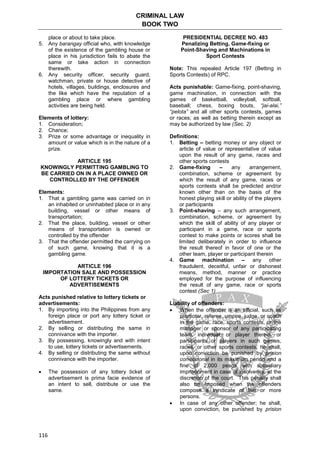
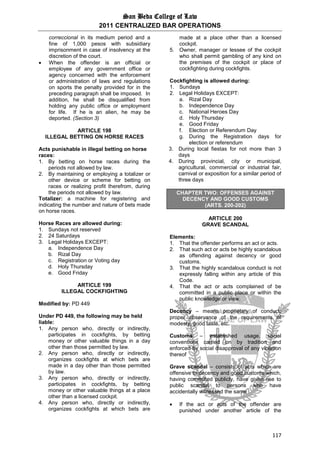
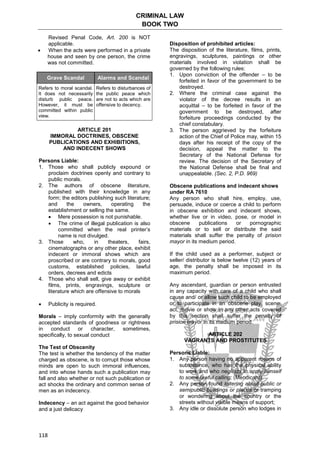
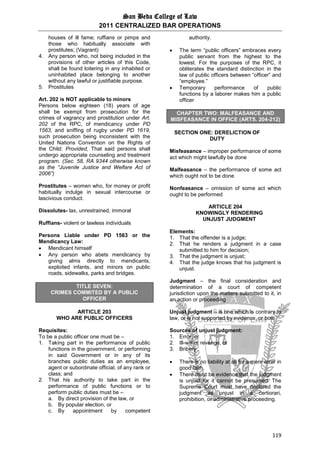
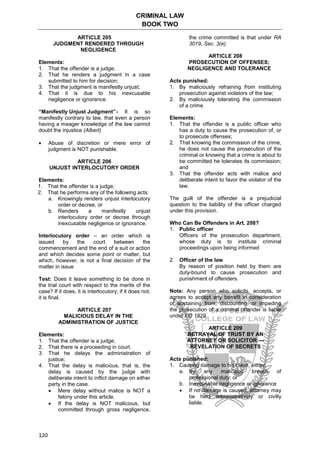
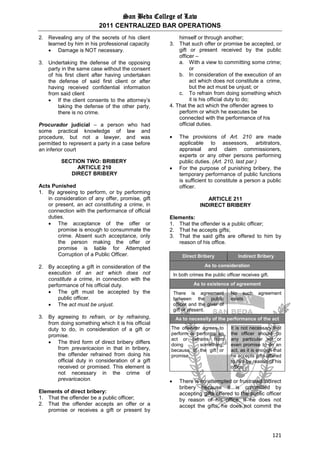
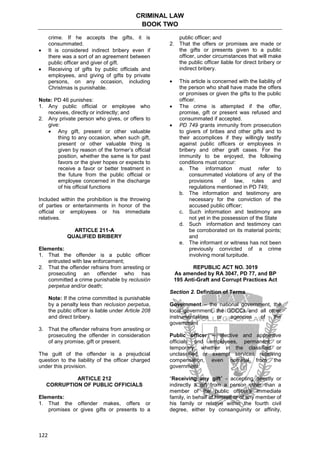
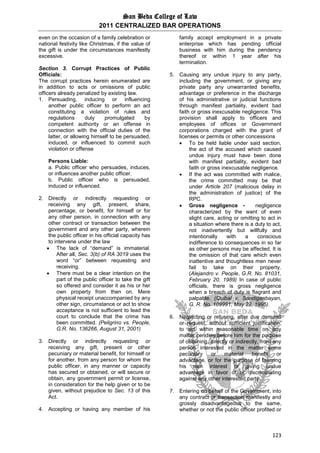
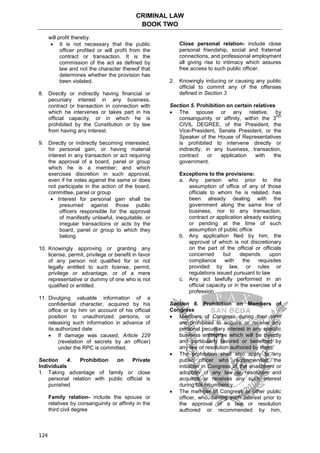
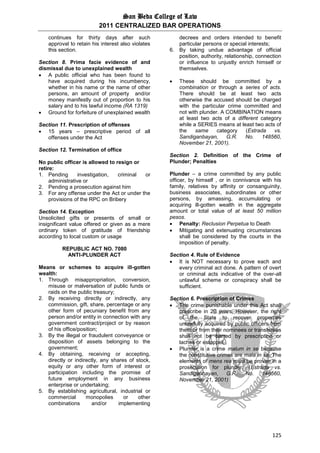
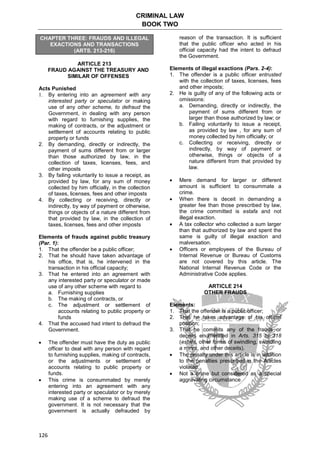
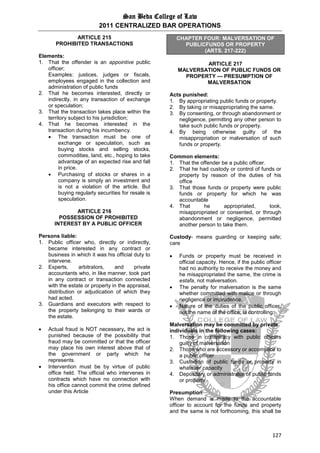
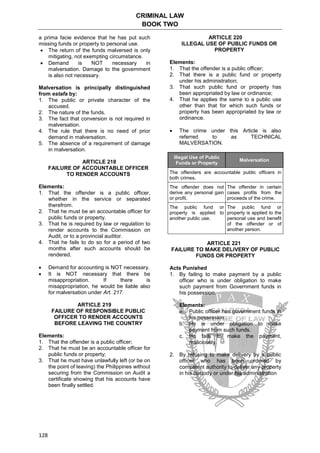
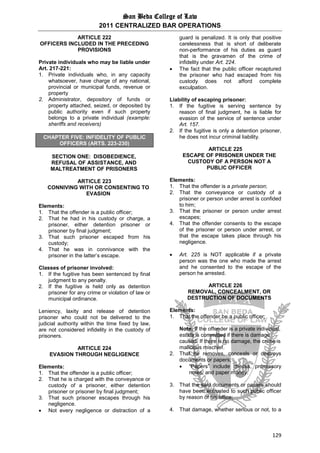
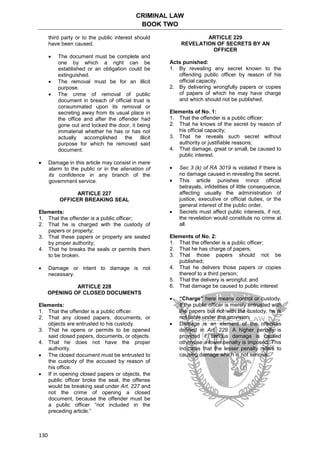
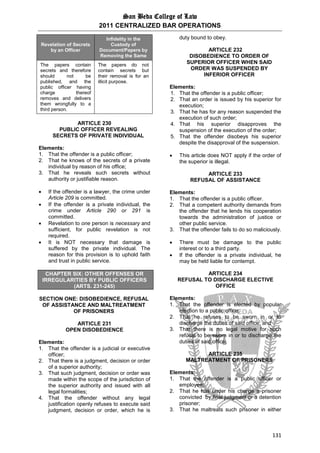
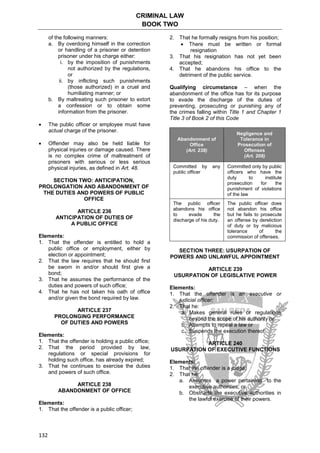
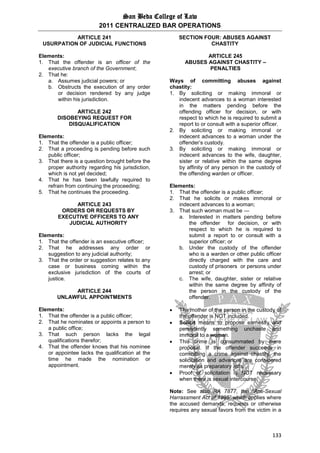
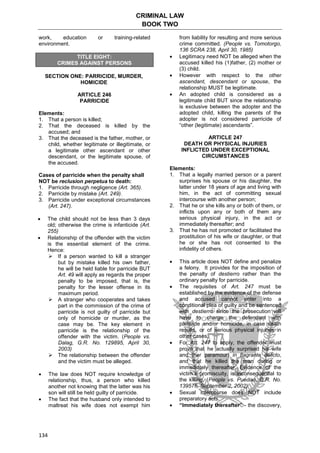
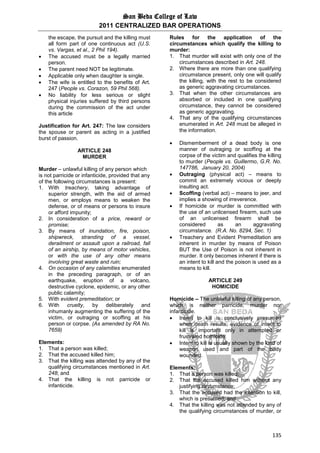
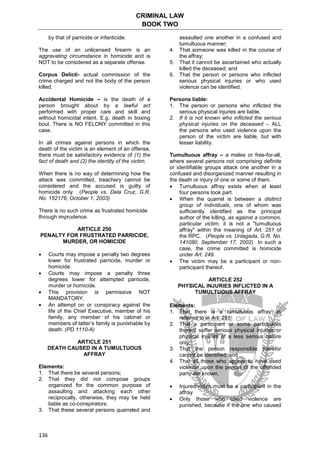
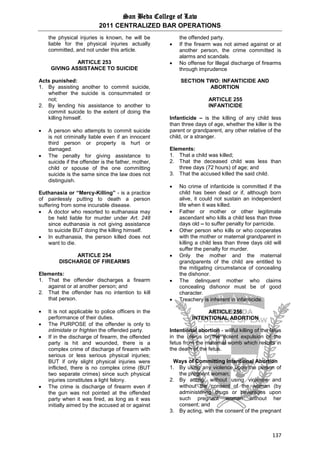
![CRIMINAL LAW
BOOK TWO
138
woman, by administering drugs or
beverages.
Elements:
1. That there is a pregnant woman;
2. That violence is exerted, or drugs or
beverages administered, or that the
accused otherwise acts upon such
pregnant woman;
3. That as a result of the use of violence or
drugs or beverages upon her, or any other
act of the accused, the fetus dies, either in
the womb or after having been expelled
therefrom; and
4. That the abortion is intended.
Person liable in Intentional Abortion:
1. The person who intentionally caused the
abortion under Art. 256;
2. The pregnant woman if she consented
under Art. 258.
As long as the fetus dies as a result of the
violence used or the drugs administered,
the crime of abortion exists, even if the
fetus is over or less than 6 months, or is
full term.
If the fetus could sustain an independent
life (the fetus must have an intrauterine life
of not less than 7 months) after its
separation from the maternal womb, and it
is killed, the crime is infanticide, not
abortion.
Fetus must die in consummated abortion.
If it is intentional abortion and the fetus
does not die, it is frustrated intentional
abortion when all the acts of execution
have been performed by the offender.
If the abortion is not intended and the fetus
does not die, in spite of the violence
intentionally exerted, the crime may only
be physical injuries. There is no crime of
frustrated unintentional abortion, in view of
the lack of intention to cause an abortion.
If there is no intention to cause abortion
and no violence, there is no abortion of
any kind.
ARTICLE 257
UNINTENTIONAL ABORTION
Elements:
1. That there is a pregnant woman;
2. That violence is used upon such pregnant
woman without intending an abortion;
3. That the violence is intentionally exerted;
and
4. That as a result of the violence, the fetus
dies, either in the womb or after having
been expelled therefrom.
Violence refers to actual physical force.
CONFLICTING VIEWS: The offender must
have known of the woman’s pregnancy
(People v. Carnaso, C.A., 61 OG 3623)
However, in US v. Jeffrey (GR No. 5597,
March 5, 1910), it was ruled that
knowledge of such pregnancy was not
necessary.
In the case of People vs. Salufrania (159
SCRA 401 [1988]), the Supreme Court
ruled that despite knowledge of the
accused of his wife’s pregnancy, the intent
to cause the abortion has not been
sufficiently established, thus, the accused
is only liable for the complex crime of
parricide (for the death of wife) with
unintentional abortion (for the death of the
fetus in the mother’s womb).
If grave threats were made to cause
abortion, a complex crime of grave threats
and intentional abortion is committed. If
light threats were made, two separate
crimes of light threats and intentional
abortion are committed.
There is a complex crime of homicide with
unintentional abortion. (People v.
Genoves, 33 O.G. 2201).
There is complex crime of parricide with
abortion. (People v. Villanueva, 242 SCRA
47 [1995]).
ARTICLE 258
ABORTION PRACTICED BY THE WOMAN
HERSELF OR HER PARENTS
Elements:
1. That there is a pregnant woman who has
suffered an abortion;
2. That the abortion is intended; and
3. That the abortion is caused by –
a. The pregnant woman herself;
b. Any other person, with her consent; or
c. Any of her parents, with her consent,
for the purpose of concealing her
dishonor.
Under a and c above, the woman is liable
under Art. 258; while the third person
under b is liable under Art. 256.
If the purpose is other than to conceal the
woman’s dishonor, abortion by any of her
parents falls under Art. 256.
Liability of the pregnant woman is
mitigated if her (not including the maternal
grandparents’) purpose is to conceal her
dishonor.](https://image.slidesharecdn.com/crimiibook2-160120043435/85/Crim-ii-book-2-64-320.jpg)
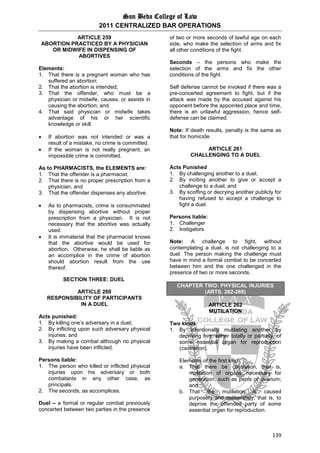
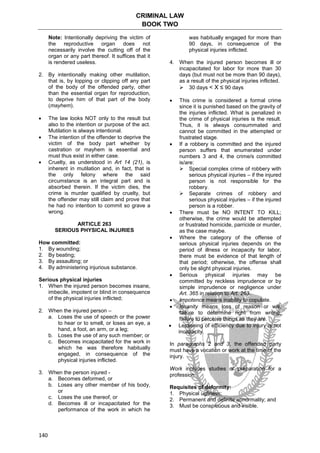
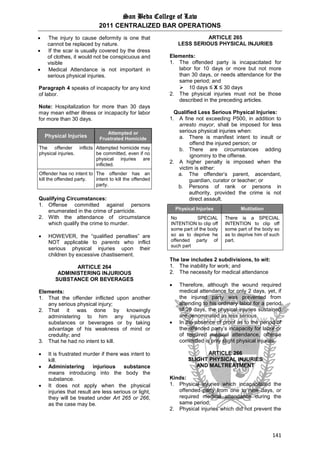
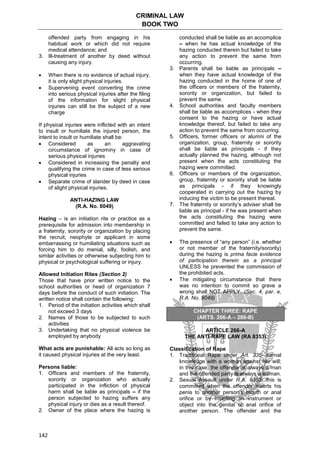
![San Beda College of Law
2011 CENTRALIZED BAR OPERATIONS
143
offender can either be a man or a woman
in the case of the insertion of any
instrument or object.
How rape is committed:
1. By a man who shall have carnal
knowledge of a woman under any of the
following circumstances:
a. Through force, threat or intimidation;
b. When the offended party is deprived
of reason or otherwise unconscious;
c. By means of fraudulent machinations
or grave abuse of authority;
d. When the offended party is under
twelve (12) years of age or is
demented, even though none of the
circumstances mentioned above be
present.
Elements:
a. That the offender is a man;
b. That the offender had carnal
knowledge of a woman;
c. That such act is accomplished under
any of the following circumstances:
i. By using force or intimidation, or
ii. When the woman is deprived of
reason or otherwise unconscious,
or
iii. By means of fraudulent
machination or grave abuse of
authority, or
iv. When the woman is under 12
years of age or demented.
Notes: The offender must not have known
that the victim is demented, otherwise
qualified rape is committed.
Circumstance (iv) does not only pertain to
chronological age but also to mental age
(People vs. Atento, 196 SCRA 357, 1991)
2. By any person who, under any of the
circumstances mentioned in paragraph 1
hereof, shall commit an act of sexual
assault by inserting his penis into another
person’s mouth or anal orifice of another
person, or any instrument or object, into
the genital or anal orifice of another
person.
Elements:
a. That the offender commits an act of
sexual assault;
b. That the act of sexual assault is
committed by any of the following
means:
i. By inserting his penis into another
person’s mouth or anal orifice;
ii. By inserting any instrument or
object into the genital or anal
orifice of another person.
c. That the act of sexual assault is
accomplished under any of the
circumstances enumerated under the
first act of committing rape.
Under R.A. 8353, the crime of rape can
now be committed by a male or a female.
To be CONSUMMATED, it is not essential
that there be a complete penetration of the
female organ, neither is it essential that
there be a rupture of the hymen.
However, there must be sufficient and
convincing proof that the penis indeed
touched the labias or slid into the
female organ, and not merely stroked
the external surface thereof, for the
accused to be convicted of
consummated rape. Absent of any
showing of the slightest penetration of
the female organ, it can only be
attempted rape, if not acts of
lasciviousness. (People vs. Campuhan,
329 SCRA 270 [2000])
For a charge for rape by sexual assault
with the use of one’s fingers or any
other object to be consummated, there
should be evidence of at least the
slightest penetration of the sexual
organ and not merely a brush or graze
of its surface. (People v. Dela Cruz,
GR No. 180501, December 24, 2008)
There is NO crime of FRUSTRATED
RAPE. The slightest penetration or mere
touching of the genitals consummates the
crime of rape.
There is ATTEMPTED RAPE when there
is no penetration of the female organ
because not all the acts of execution were
performed. However, there must be an
intention to have carnal knowledge of the
woman against her will.
Acknowledgment of the consummated act
is not considered giving of consent.
In Statutory Rape, the offender’s
knowledge of the victim’s age is
IMMATERIAL.
Force employed against the victim of rape
need not be of such character as could not
be resisted. It is enough that the force
used is sufficient to consummate the
culprit’s purpose of copulating with the
victim.
If the woman contributed in some way to
the consummation of the act, this may
constitute an offense other than rape.
Intimidation includes the moral kind.
Having sex with a deaf-mute is not rape in](https://image.slidesharecdn.com/crimiibook2-160120043435/85/Crim-ii-book-2-69-320.jpg)
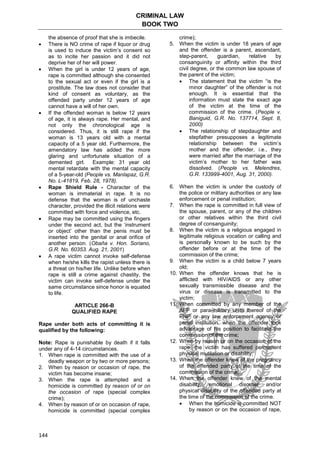
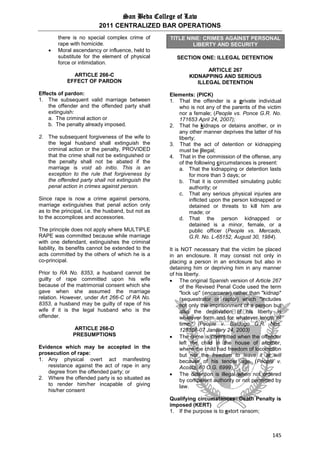
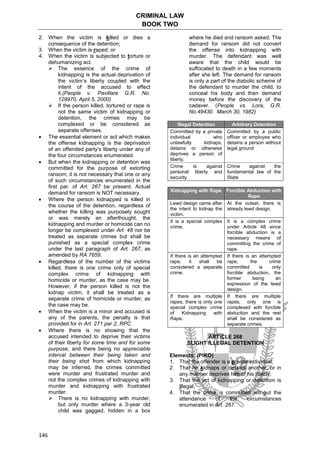
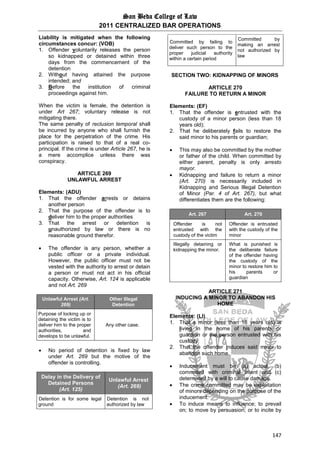
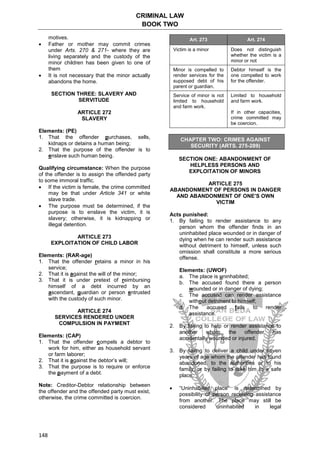
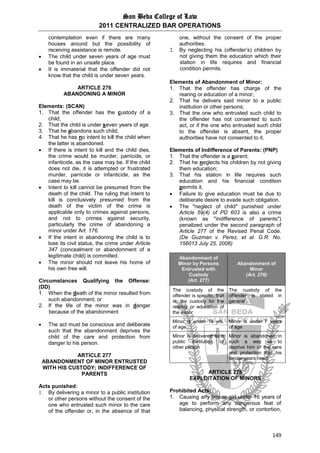
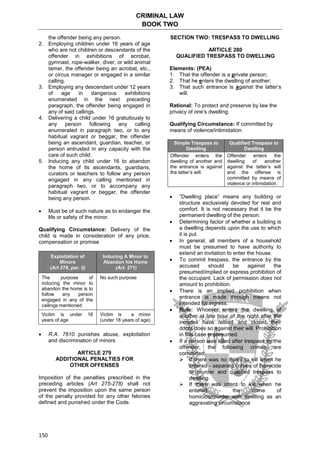
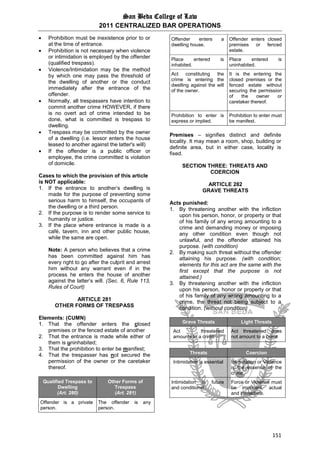
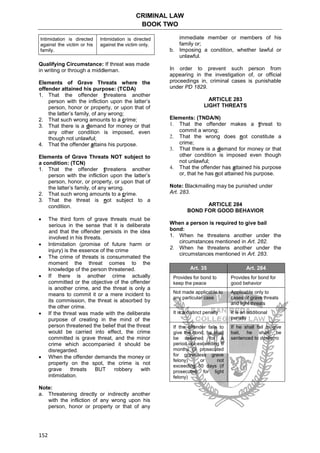
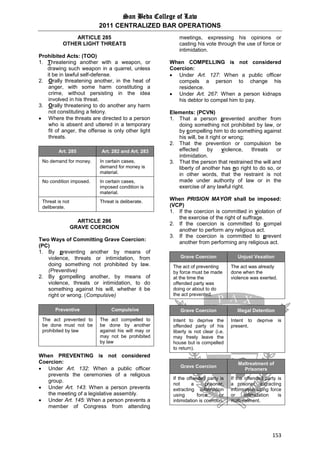
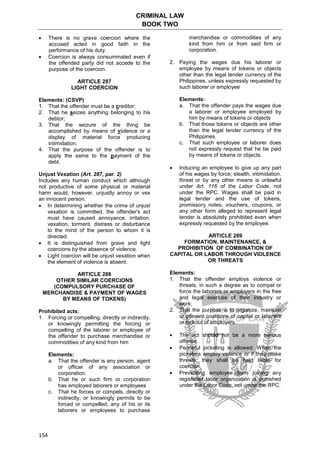
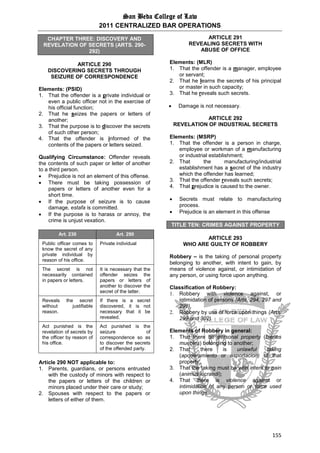
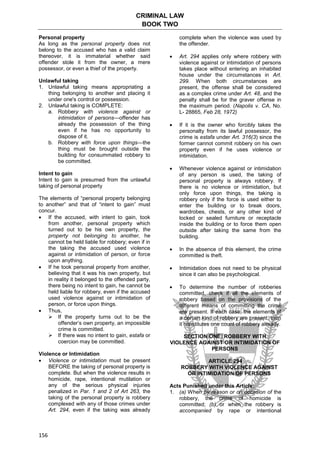
![San Beda College of Law
2011 CENTRALIZED BAR OPERATIONS
157
mutilation or arson.
2. When by reason or on occasion of such
robbery any of the physical injuries
resulting in insanity, imbecility, impotency
or blindness is inflicted. (subdivision 1 of
Art. 263)
3. When by reason or on occasion of
robbery, any of the physical injuries
penalized in subdivision 2 of Art. 263 is
inflicted.
When the person injured -
a. Loses the use of speech or the power
to hear or to smell, or loses an eye, a
hand, a foot, an arm, or a leg;
b. Loses the use of any such member; or
c. Becomes incapacitated for the work in
which he was therefore habitually
engaged, in consequence of the
physical injuries inflicted;
4. (a) If the violence or intimidation employed
in the commission of the robbery is carried
to a degree clearly unnecessary for the
commission of the crime; or (b) When in
the course of its execution, the offender
shall have inflicted upon ANY PERSON
NOT RESPONSIBLE FOR ITS
COMMISSION physical injuries covered
by subdivisions 3 and 4 of Art. 263.
When the person injured -
a. Becomes deformed, or
b. Loses any other member of his body,
or
c. Loses the use thereof, or
d. Becomes ill or incapacitated for the
performance of the work in which he
was habitually engaged for more than
90 days, in consequence of the
physical injuries inflicted.
When the injured person becomes ill or
incapacitated for labor for more than 30
days (but must not be more than 90 days),
as a result of the physical injuries inflicted.
5. If the violence employed by the offender
does not cause any of the serious physical
injuries defined in Art. 263, or if the
offender employs intimidation only. (simple
robbery)
These offenses are known as SPECIAL
COMPLEX CRIMES. Crimes defined under
this article are the following:
1. Robbery with homicide
2. Robbery with rape
3. Robbery with intentional mutilation
4. Robbery with arson
5. Robbery with serious physical injuries
Robbery with Homicide
The term “homicide” is used in its generic
sense and includes any kind of killing,
whether parricide or murder or where
several persons are killed and the name of
this special complex crime shall remain as
robbery with homicide. The qualifying
circumstance (e.g. treachery in murder)
will only become an aggravating
circumstance.
Homicide may precede robbery or may
occur after robbery. What is essential is
that the offender must have intent to take
personal property before the killing.
Where the offender’s intention to take
personal property of the victim arises as an
afterthought, where his original intent was
to kill, he is guilty of two separate crimes of
homicide or murder, as the case may be,
and theft.
The phrase “by reason” covers homicide
committed before or after the taking of
personal property of another, as long as
the motive of the offender in killing is to
deprive the victim of his personal property
which is sought to be accomplished by
eliminating an obstacle, killing a person
after robbery to do away with a witness or
to defend the possession of the stolen
property.
There is robbery with homicide even if the
person killed was a bystander and not the
person robbed or even if it was one of the
offenders. The law does not require the
victim of the robbery be also the victim of
homicide.
Robbery with homicide exists even if the
death of the victim supervened by mere
accident. It is sufficient that a homicide
resulted by reason or on the occasion of
the robbery. (People v. Mangulabnan, 99
Phil. 992 [1956])
Robbery with Rape
In robbery with rape, the law uses the
phrase “when the robbery shall have been
accompanied by rape”. But like in robbery
with homicide, the offender must have the
intent to take the personal property
belonging to another with intent to gain,
and such intent must precede the rape.
Robbery with rape does not cover robbery
with attempted rape since what is provided
by the RPC is a special complex crime of
robbery with rape. Robbery with attempted
rape cannot be complexed under Art. 48
since one crime is not a necessary means
of committing the other nor can both be](https://image.slidesharecdn.com/crimiibook2-160120043435/85/Crim-ii-book-2-83-320.jpg)
